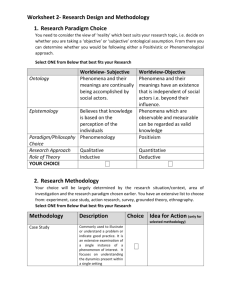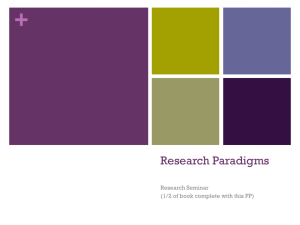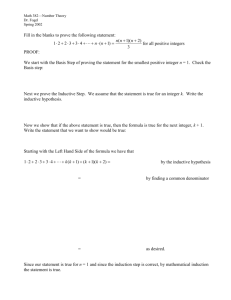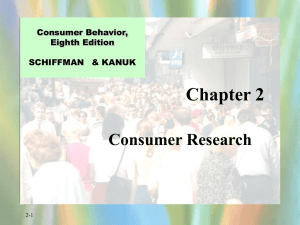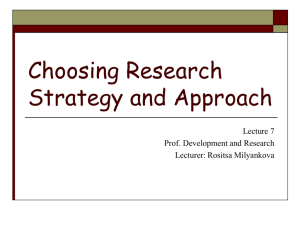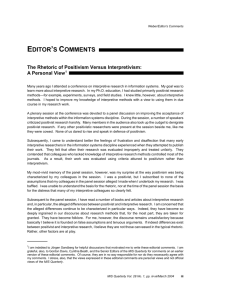Research Glossary
advertisement
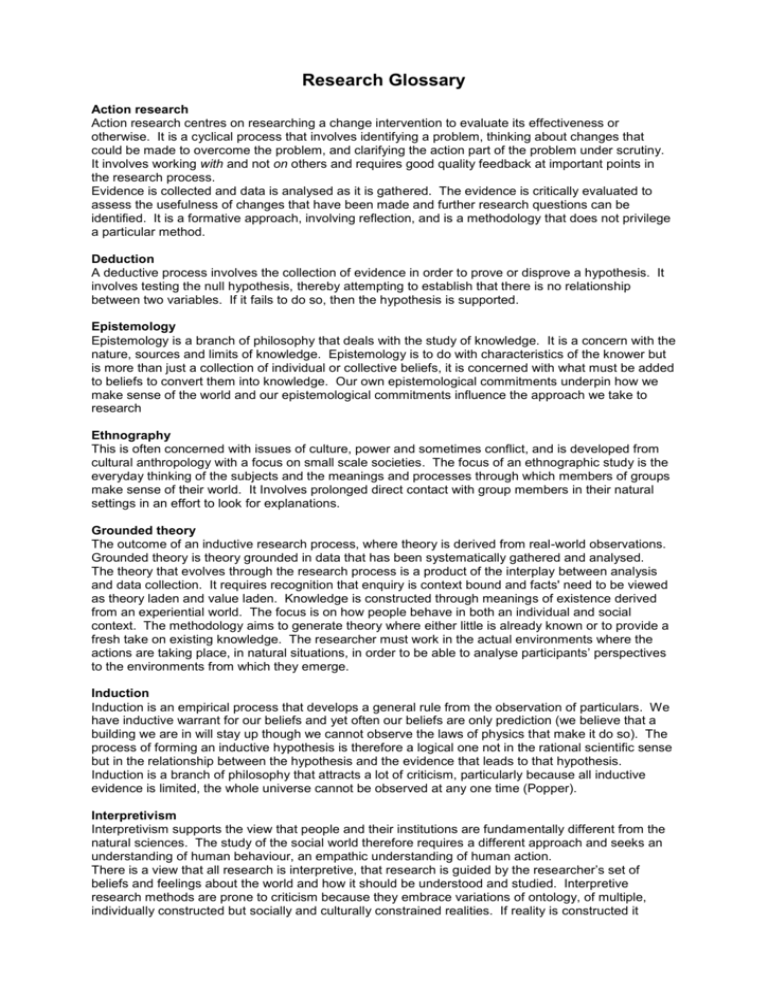
Research Glossary Action research Action research centres on researching a change intervention to evaluate its effectiveness or otherwise. It is a cyclical process that involves identifying a problem, thinking about changes that could be made to overcome the problem, and clarifying the action part of the problem under scrutiny. It involves working with and not on others and requires good quality feedback at important points in the research process. Evidence is collected and data is analysed as it is gathered. The evidence is critically evaluated to assess the usefulness of changes that have been made and further research questions can be identified. It is a formative approach, involving reflection, and is a methodology that does not privilege a particular method. Deduction A deductive process involves the collection of evidence in order to prove or disprove a hypothesis. It involves testing the null hypothesis, thereby attempting to establish that there is no relationship between two variables. If it fails to do so, then the hypothesis is supported. Epistemology Epistemology is a branch of philosophy that deals with the study of knowledge. It is a concern with the nature, sources and limits of knowledge. Epistemology is to do with characteristics of the knower but is more than just a collection of individual or collective beliefs, it is concerned with what must be added to beliefs to convert them into knowledge. Our own epistemological commitments underpin how we make sense of the world and our epistemological commitments influence the approach we take to research Ethnography This is often concerned with issues of culture, power and sometimes conflict, and is developed from cultural anthropology with a focus on small scale societies. The focus of an ethnographic study is the everyday thinking of the subjects and the meanings and processes through which members of groups make sense of their world. It Involves prolonged direct contact with group members in their natural settings in an effort to look for explanations. Grounded theory The outcome of an inductive research process, where theory is derived from real-world observations. Grounded theory is theory grounded in data that has been systematically gathered and analysed. The theory that evolves through the research process is a product of the interplay between analysis and data collection. It requires recognition that enquiry is context bound and facts' need to be viewed as theory laden and value laden. Knowledge is constructed through meanings of existence derived from an experiential world. The focus is on how people behave in both an individual and social context. The methodology aims to generate theory where either little is already known or to provide a fresh take on existing knowledge. The researcher must work in the actual environments where the actions are taking place, in natural situations, in order to be able to analyse participants’ perspectives to the environments from which they emerge. Induction Induction is an empirical process that develops a general rule from the observation of particulars. We have inductive warrant for our beliefs and yet often our beliefs are only prediction (we believe that a building we are in will stay up though we cannot observe the laws of physics that make it do so). The process of forming an inductive hypothesis is therefore a logical one not in the rational scientific sense but in the relationship between the hypothesis and the evidence that leads to that hypothesis. Induction is a branch of philosophy that attracts a lot of criticism, particularly because all inductive evidence is limited, the whole universe cannot be observed at any one time (Popper). Interpretivism Interpretivism supports the view that people and their institutions are fundamentally different from the natural sciences. The study of the social world therefore requires a different approach and seeks an understanding of human behaviour, an empathic understanding of human action. There is a view that all research is interpretive, that research is guided by the researcher’s set of beliefs and feelings about the world and how it should be understood and studied. Interpretive research methods are prone to criticism because they embrace variations of ontology, of multiple, individually constructed but socially and culturally constrained realities. If reality is constructed it implies we are active and implicated in that process. This is in contrast to positivist approaches within which the researcher is independent of reality. In an interpretivist paradigm, the researcher is always part of the reality they are attempting to understand. Ontology Ontology is concerned with our own conceptions of being and reality. How we perceive being and reality will be influenced by our epistemological stance. In social sciences there are four main ontological approaches. Realism - that facts are out there waiting to be discovered, epiricism - we can observe the world and evaluate our observations in relation to 'facts', positivism - which confines genuine knowledge within the bounds of science and post-modernism - which has a liberating view of the elusive nature of facts. Paradigm A paradigm is a particular stance or standpoint which governs the way an individual views a phenomenon and guides their approach to research. In simple terms, the main research paradigms are positivism and interpretivism. Phenomenography Phenomenography is the empirical study of the limited number of qualitatively different ways in which we experience, conceptualise, understand, perceive, apprehend etc, various phenomena in and aspects of the world around us. It does not involve observation of the phenomenon itself, but relies on semi-structured interviews with individuals to investigate their experience of the phenomenon. It then maps variations in their experience, and if possible attempts to establish a hierarchy. Much research into student conceptions of learning and their approaches to study has employed a phenomenographic methodology. Phenomenology Aims to develop an understanding of complex issues that may or may not be implicit in surface responses. We all approach the world with a set of knowledge that is made up of socially derived common sense constructs. However, this knowledge is always open-ended and incomplete. Language is the main medium for transmitting meaning and provides a methodological orientation for a phenomenology of social life concerned with the relation between language use and experience. This proposes therefore that there is only one legitimate source of data, and that is the views and experiences of the participants themselves. Participants will only be selected if they have the lived experience under study. Sampling is therefore purposive and the main instrument of data collection is the interview. Through careful study of individuals the researcher aims to discover the deeper meaning of the lived experience. It is about how individuals make sense of the world around them. Positivism Positivism is a philosophical paradigm which confines genuine knowledge within the bounds of science based on formal logic or mathematics. It is based on the belief that there is an objective reality and that knowledge exists as something that can be observed and measured. A positivist approach generally involves quantitative research methods. Qualitative research Qualitative research involves the collection and analysis of narrative data, and is interested in the lived experiences of individuals. It is generally informed by an interpretivist paradigm, employing inductive approaches to develop theory from the evidence base. Qualitative research is less interested in extending its findings to the whole population, but creates insight into how individuals experience a phenomenon. Quantitative research This is research which involves the collection and analysis of numerical data. It is informed by a positivist paradigm, and employs a deductive approach to hypothesis testing. Key issues in quantitative research are reliability and validity, so the research findings can be generalised to the whole population. Reliability Reliability is generally understood to represent the probability that repeating the research procedure under the same conditions would produce similar results. While it often refers to the consistency of the measuring instrument, it may also relate to the people conducting the research. Sample This is a sub-group of a population which is taken to represent the entire population. The most important feature of a sample is that it is representative, displaying similar characteristics to the population as a whole. Samples may be totally random, or may be stratified to ensure that there are sufficient cases from each category (e,g. male/female students, different faculties, levels, modes of study). A purposive sample is one where the researcher deliberately selects cases which are considered to be representative or relevant. Triangulation The use of a variety of data sources or methods to examine a specific phenomenon, either simultaneously or sequentially, in order to produce a more accurate account of the phenomenon under investigation. Triangulation is a useful method of checking the validity of research findings. The term is commonly used interchangeably with mixed methods. Validity Validity refers to the accuracy and truth of the data and findings that are produced, the extent to which research measures or describes what it is supposed to measure or describe. Distinctions can be made between internal validity (the extent to which findings represent the phenomenon being investigated) and external validity (the extent to which findings can be generalised to the wider population). Andy Hagyard: University of Lincoln Christine Keenan: Bournemouth University LearnHigher 2006
